Best laptops for music production 2022


Calling all musical artists! Whether you plan on creating the sickest bass drops or just some chill lo-fi jams, you’re going to need a solid laptop to get the job done. There are a few key things you need to look out for when choosing a laptop for music production. A high-quality processor is absolutely vital for smooth recording performance, and a decent amount of RAM will allow you to juggle multiple plugins and tracks simultaneously. Portability is a huge factor, too—if you’re taking your show on the road to a local wedding or all the way to Ibiza, you’ll need something that is easy to carry around.
If you’re not sure which laptop is right for you, don’t worry. The experts here at PCWorld have tested a ton of laptops and we have rounded up the best picks specifically for music production.
Also, check out our best laptops roundup, where you will find an even bigger selection of models at a range of prices and for a variety of needs!
Updated 04/4/2023: We’ve added the HP Dragonfly Pro as our choice for the best MacBook alternative. Read more about this new pick in the summary below.
Asus VivoBook Pro 16X OLED – Best overall
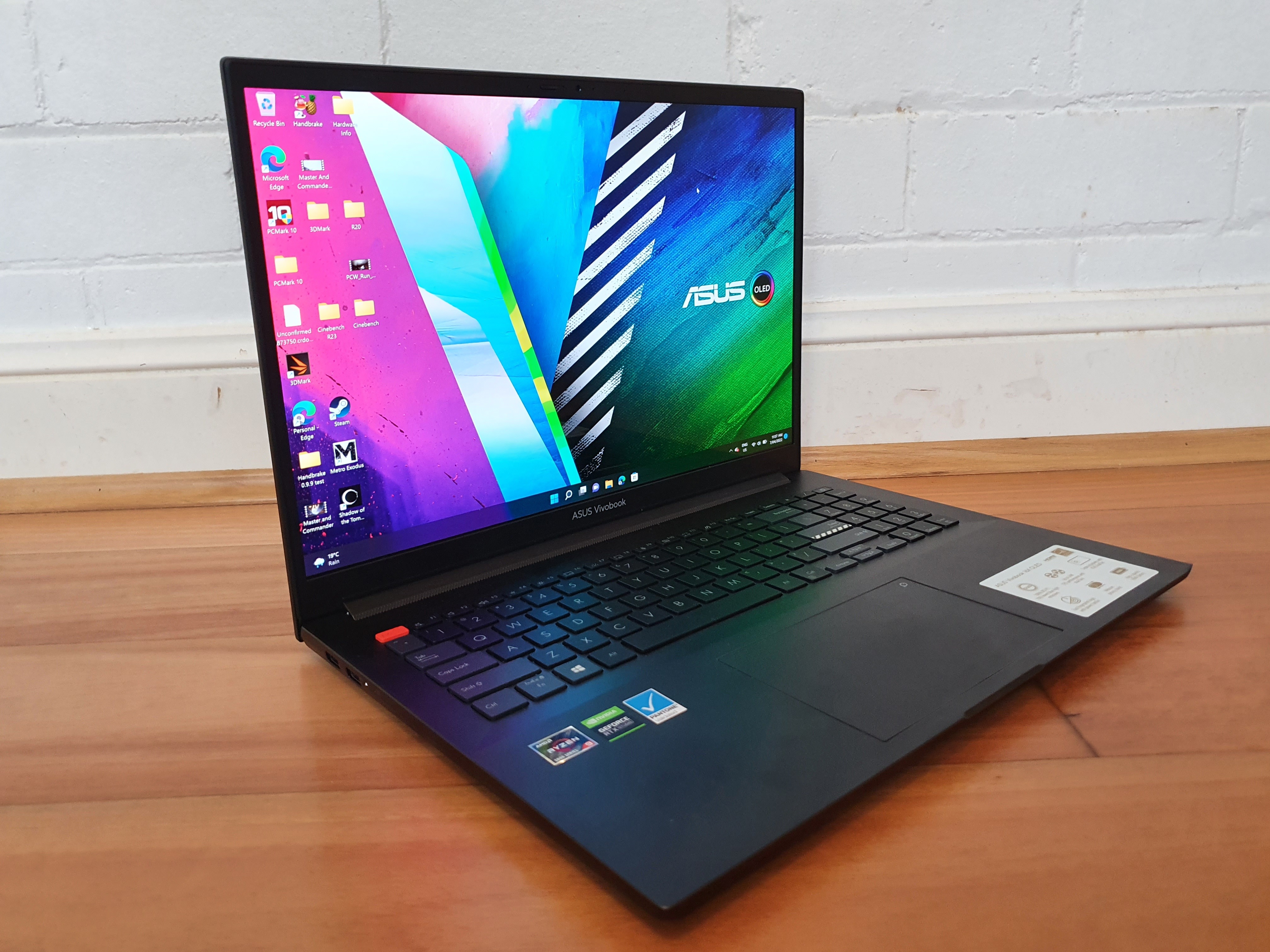
Pros
Beautiful 4K OLED display Long battery life Useful DialPad tool
Cons
Design lacks flair Lackluster webcam Price When Reviewed:$1,599.99Best Prices Today:$1449 at Asus
If you’re looking for a good all-arounder, the Asus VivoBook Pro 16X OLED is a good bet, as it ticks a lot of boxes. For one, the 4K OLED display is superb. Not only does it produce crisp images, but it’s also a good option for those who suffer from eye strain and tension headaches. If you spend endless hours looking at a screen as you edit and mix tracks, you might as well invest in one with a crystal-clear picture. The VivoBook also packs a serious punch when it comes to processing power.
The Ryzen 9 5900HX CPU is plenty fast enough for basic music production needs and everyday use. This laptop is also packing 32GB of memory and a whopping 1TB of PCIe NVMe M.2 SSD storage. That’s plenty for firing up multiple applications and storing audio files. There are a couple drawbacks you should be aware of: The webcam isn’t great (not surprising) and the fingerprint reader can have a mind of its own. Overall, however, the VivoBook Pro is a fantastic machine that any musician or DJ would love.
Read our full Asus VivoBook Pro 16X OLED review
Acer Swift 3 SF316-51 – Best budget option
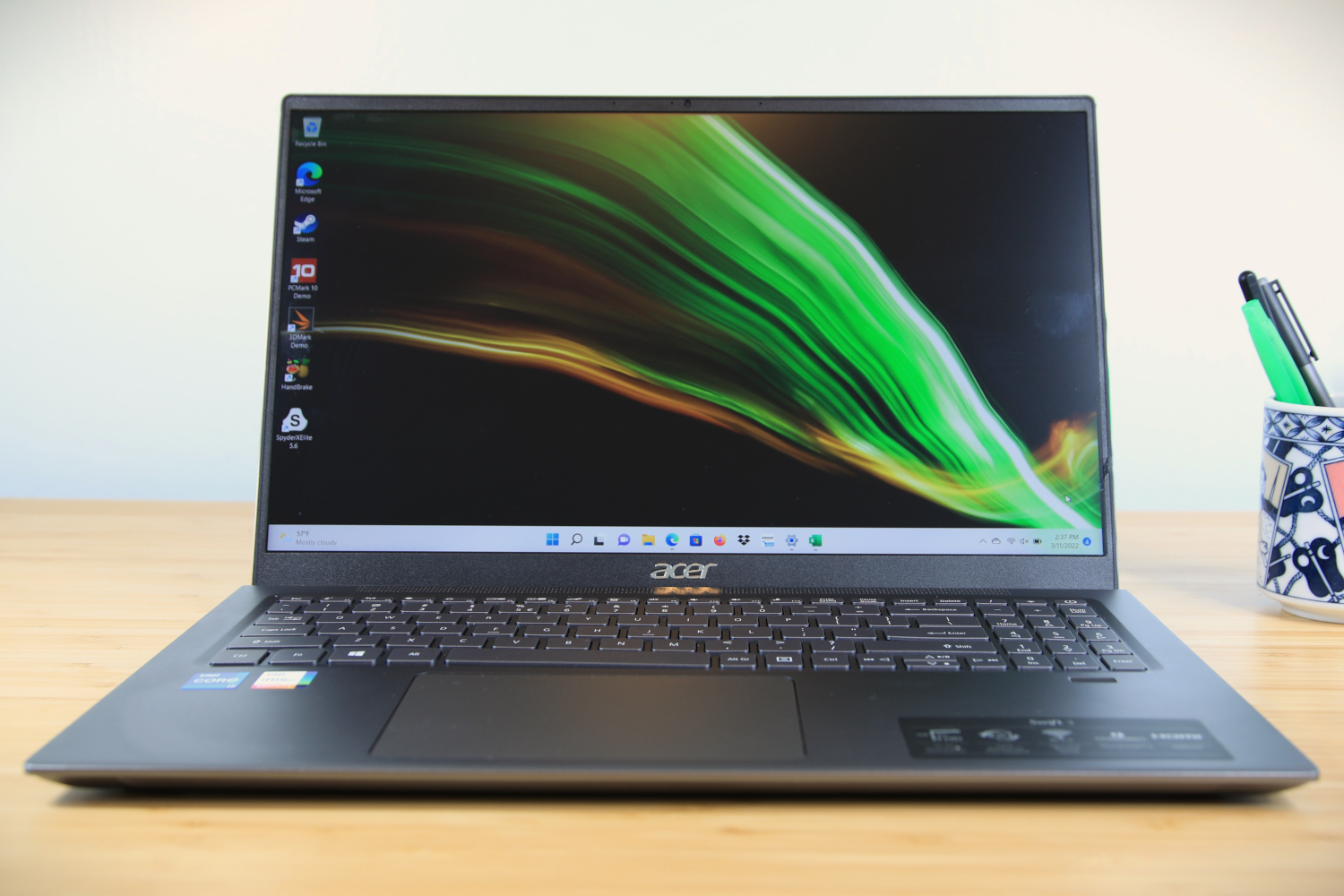
Pros
Solid chassis and build quality Large, attractive 16-inch 1080p screen Enjoyable keyboard and touchpad USB-C with charging and DisplayPort
Cons
Webcam, microphone, and speakers don’t impress Intel processor falls behind AMD alternatives Disappointing battery life Lots of bloatware Price When Reviewed:$999Best Prices Today:$899 at Amazon$925.64 at Walmart
If you’re working with a limited budget, the Acer Swift 3 is a great option. It has an Intel Core i7-11370H with four cores, 16GB of RAM, and a 512GB SSD. That’s a good amount of power and space for most music production tasks. The build quality is solid, the keyboard is comfortable to use, and the display delivers “rich, lifelike color.” The one knock we have against this machine is the battery life. Unfortunately, the laptop died after about five hours. That’s the type of result we’d expect from a gaming laptop, which drains easily due to the power-sucking components. That said, if you don’t mind sticking close to an outlet, than this a good budget buy for most musicians.
Read our full Acer Swift 3 SF316-51 review
Samsung Galaxy Book2 Pro 360 – Best battery life
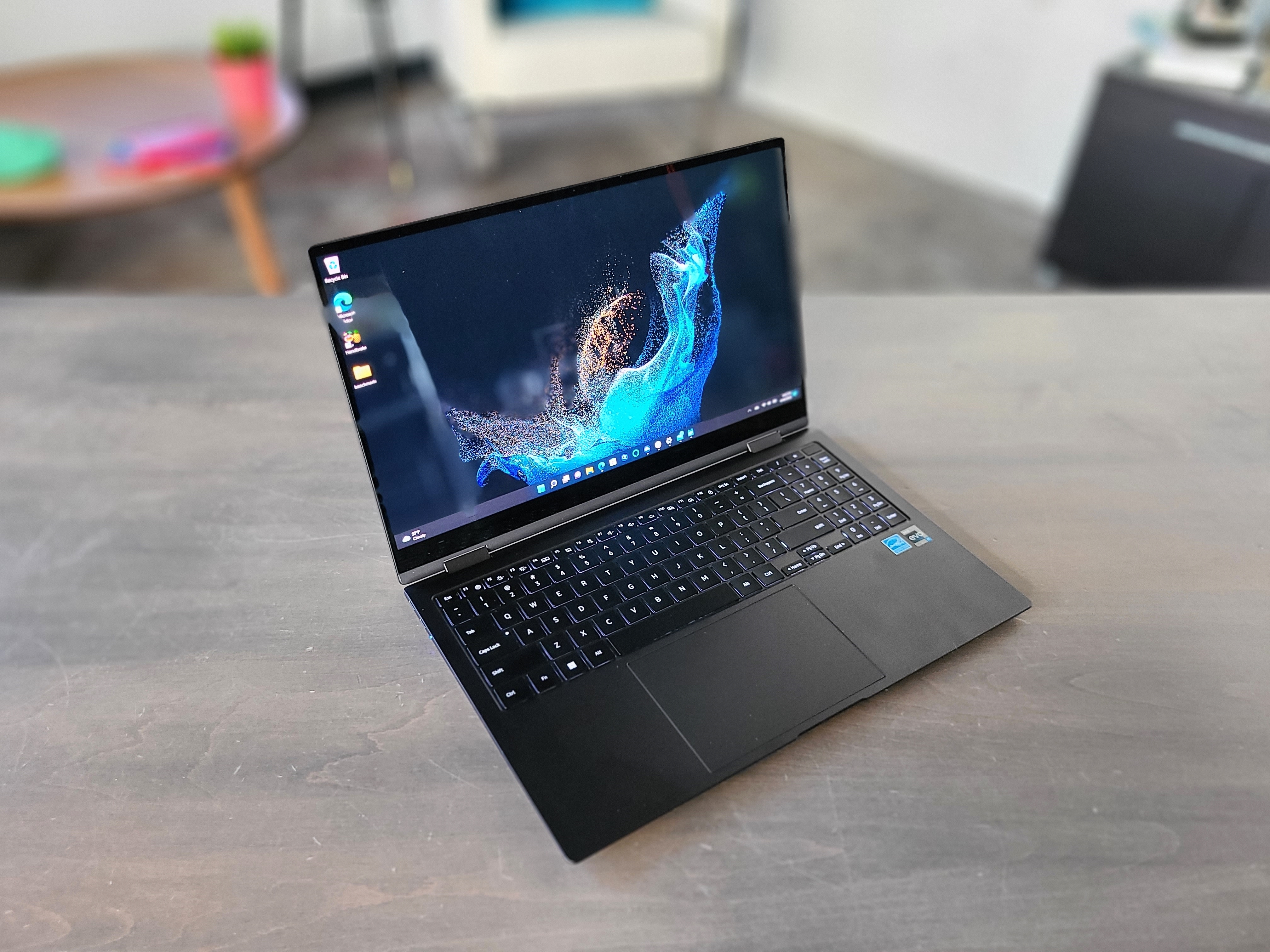
Pros
Large, high-contrast OLED screen Fantastic battery life Top-notch 12th-gen Core performance
Cons
Average keyboard Webcam doesn’t quite deliver as expected Fingerprint reader needed re-authentication Tons of additional apps Price When Reviewed:$1549.99Best Prices Today:$1549.99 at Samsung
If you’re an on-the-go musician, the Samsung Galaxy Book2 Pro 360 offers incredible battery life as well as a versatile 2-in-1 design. When we put this laptop through our battery rundown test, it lasted a total of 14 hours. That’s pretty rad, right? In addition to the awesome battery life, you’re also getting a high-contrast 15.6-inch OLED screen and zippy performance thanks to its 12th-gen Intel Core i7-1260P processor. The model we reviewed came equipped with 16GB of RAM and 1TB of SSD storage. That’s plenty sufficient for running multiple applications and working with uncompressed audio files. Although we weren’t super impressed with the keyboard or webcam, we feel the pros far outweigh the cons, especially where performance and battery life are concerned.
Read our full Samsung Galaxy Book2 Pro 360 review
Lenovo Yoga 9i 14 (2022) – Best 2-in-1 design
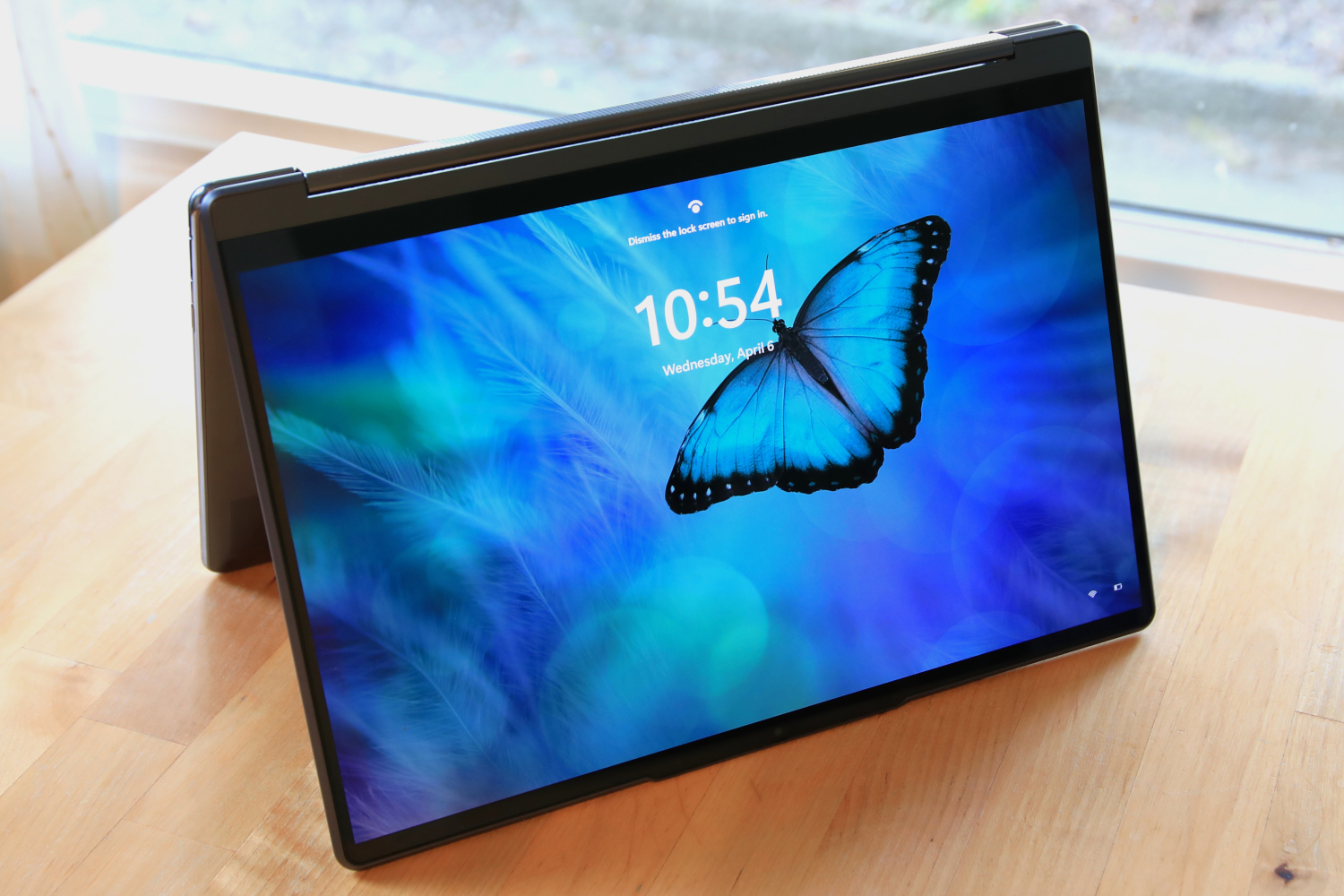
Pros
Sturdy and sleek all-metal chassis Long battery life Impressive audio output Comfortable keyboard
Cons
16:9 screen feels cramped Included stylus is too skinny Undersized touchpad Limited ports all on left side Price When Reviewed:$1,230 (entry level) | $1,449 (as reviewed)Best Prices Today:$1269.99 at Lenovo
If you prefer the portability and versatility of a convertible laptop, you may want to pick up the Lenovo Yoga 9i 14. You can prop it up like a painter’s easel or swing the screen around and use the laptop like a tablet. It features 16GB of RAM, 1TB of SSD storage, and strong battery life. You can also expect reliable performance thanks to the 12th-gen Intel Core i7 processor. It has four performance cores and eight efficiency cores. The more cores, the better, especially if you’re working with multi-track songs.
The 74 watt-hour battery is also surprisingly large for such a slim machine. It lasted 12 hours during our battery rundown benchmark, which is more than a full work day. The speakers are surprisingly punchy, too. This is important if you’re editing a song and aren’t able to plug into external speakers. While this convertible laptop has a lot to offer, we had a few nitpicks with it.
The display’s 16:9 aspect ratio may be a problem, as it makes for a squashed-looking picture. It’s not a deal breaker, but we tend to prefer taller displays. The trackpad is also smaller than we like, which takes time getting used to. The port selection is a bit limited as well. That said, if you don’t mind those small factors, then the Yoga 9i is a fabulous machine worth considering.
Read our full Lenovo Yoga 9i 14 (2022) review
Asus ROG Zephyrus G14 (2022) – Most portable
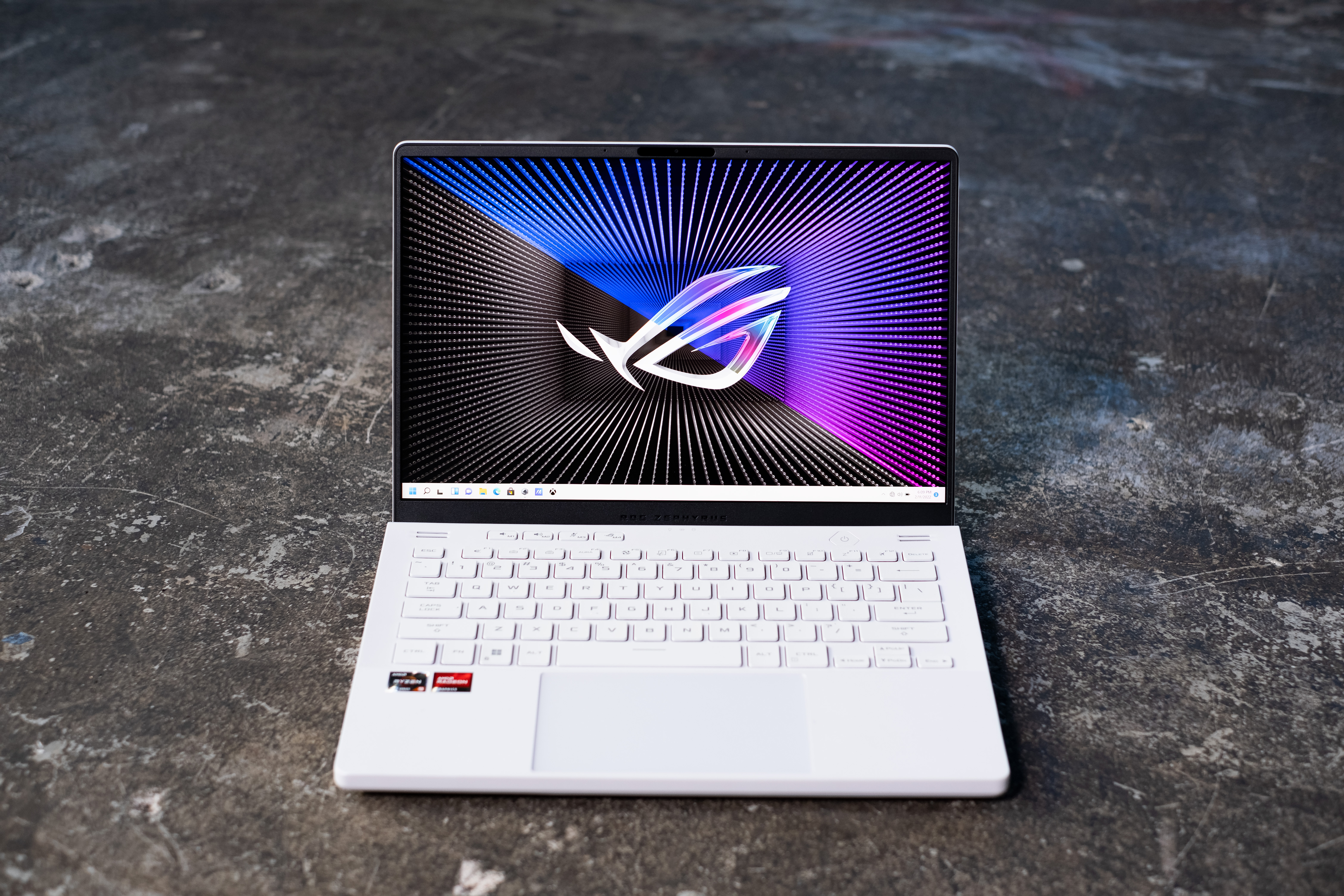
Pros
Powerful CPU and GPU performance in a very compact design AniMe Matrix screams unique It has a webcam
Cons
Half permanent RAM Keyboard backlighting is subpar Price When Reviewed:$1650 (base price) | $2500 (Radeon RX 6800S, 1TB SSD, 32GB RAM)
If you’re looking for a laptop that’s both portable and powerful, the Asus ROG Zephyrus G15 will surely fit the bill. It weighs a little over three pounds, which puts it in the ultraportable category. The AMD Ryzen 9 6900HS processor delivers zippy exceptional. Plus, you’re getting 32GB of DDR5 RAM and 1TB of PCIe 4.0 SSD storage. That’s an epic combination for heavy-duty music production sessions. The keyboard is less-than-stellar, though. It feels a bit soft and the backlighting is nothing to write home about. That said, if you’re in the market for a lightweight laptop that delivers reliable performance, you really can’t go wrong with the Zephyrus G14.
Read our full ROG Zephyrus G14 (2022) review
HP Dragonfly Pro – Best MacBook alternative
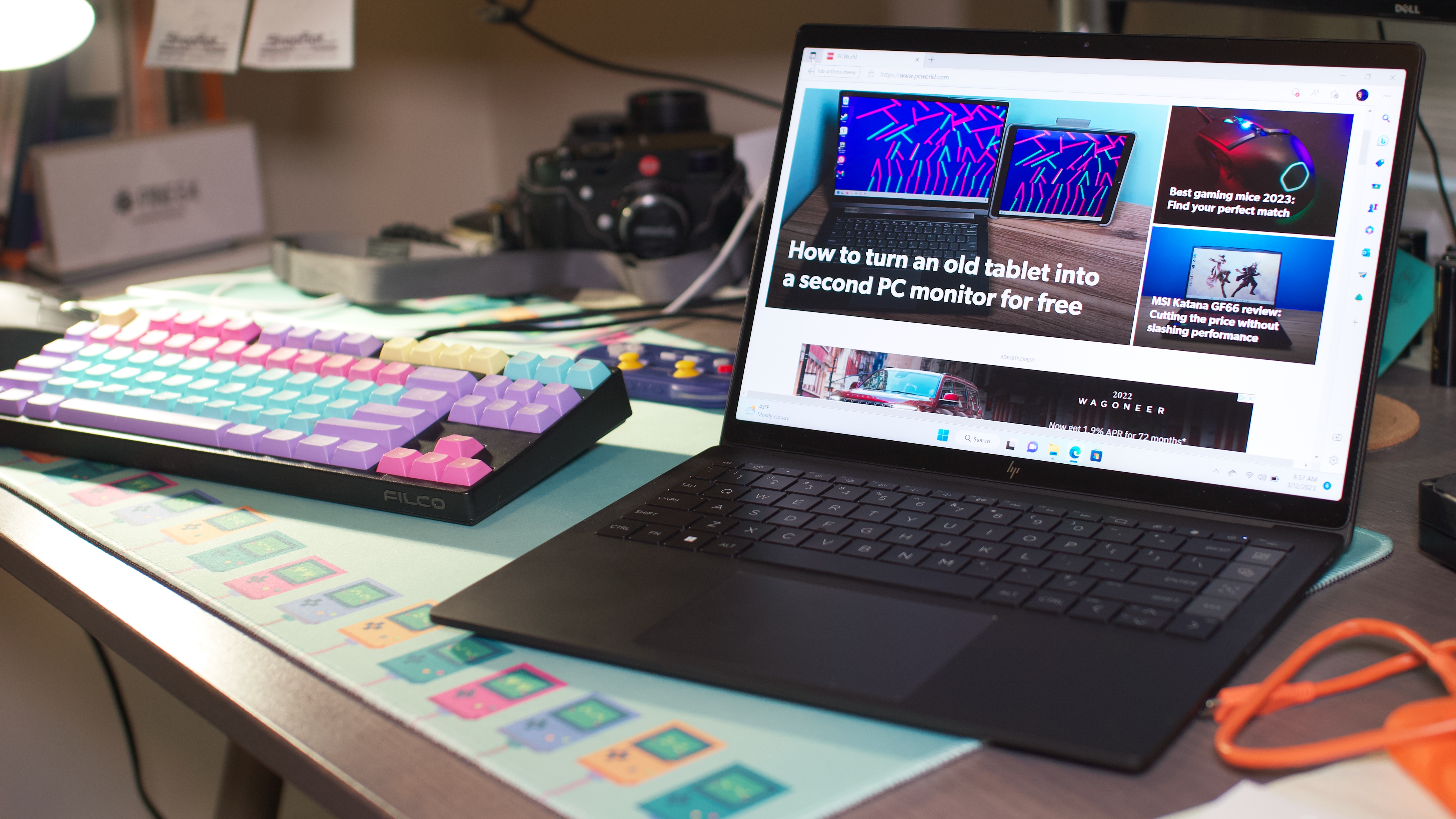
Pros
Premium materials Powerful AMD Ryzen chip Surprising four speaker setup Good battery life High degree of value for the dollar
Cons
All myHP keyboard keys should be remappable No user upgradeable components No headphone jack Only 2 high-speed USB-C ports Price When Reviewed:$1,399Best Prices Today:$1549.99 at HP
The HP Dragonfly Pro comes with all of the attractive design, incredible efficiency, and great performance of a MacBook Pro but in a Windows device. HP partnered with AMD to create this slim laptop that packs the latest-generation Ryzen 7 processor with eight high-performance cores and a robust Radeon 680M graphic card. All of the performance features are great for music production, but as an added bonus, we were incredibly impressed with the quad speakers on this laptop. Everything from loud action movies to intricate electronic music songs sounds crisp and clear without noticeable distortion.
The laptop also has a thin and attractive design, built with a high-quality aluminum and polycarbonate. However, this laptop takes a minimalist approach to ports, which means if you rely on a bunch of plug-in accessories you’ll need to buy a dock. The display is nice enough, but it does have some catching up to do if it hopes to rival Apple’s best. Still, for a laptop that is significantly cheaper than the current line of MacBook Pro models, this Dragonfly Pro laptop from HP is a more than worthy competitor and the high-quality speakers will allow you to continue producing your masterpieces on the go.
Read our full HP Dragonfly Pro review
How we tested
The PCWorld team puts each and every Windows laptop through a series of benchmarks that test GPU and CPU performance, battery life, and so on. The idea is to push the laptop to its limits and then compare it against others we’ve tested. Below, you’ll find a breakdown of each test and the reasons why we run them.
Windows laptops
PCMark 10: PCMark 10 is how we determine how well the laptop handles lighter tasks like web browsing, word processing, spreadsheets, and so on. This is how we simulate everyday use.HandBrake: HandBrake is more intensive than PCMark 10. It measures how long a laptop’s CPU takes to encode a beefy 30GB file. Think of it as a CPU stress test.Cinebench: Cinebench is a brief stress test of the CPU cores. It does this by rendering a 2D scene over a short period of time. This test shows us how the CPU splits a workload.3DMark: 3DMark checks if 3D performance remains consistent over time by running graphic-intensive clips. These benchmarks are especially important when it comes to testing gaming laptops.Video rundown test: To gauge battery life, we loop a 4K video using Windows 10’s Movies & TV app until the laptop dies. If you travel a bunch, you’ll want a battery that can last longer than a full work day.
FAQ
1.
How much processing power will I need?
Whether you’re recording multiple tracks or editing songs, you’re going to need a fast processor to keep things running smooth. That’s why we recommend springing for an Intel Core i5 or i7 with six to eight cores. A processor with multiple cores will help better divide the workload. For AMD options, go for a Ryzen 5 or 7. If you need additional power, a Ryzen 9 will do you just fine.
2.
What about memory and storage?
Music production software usually eats up a lot of power, so you’re going to need at least 16GB of RAM. As for storage, it really depends on the size of your project. For more basic needs, 512GB of SSD storage is suitable. If you’re dealing with uncompressed audio tracks, go for a 1TB SSD, as those files can take up a ton of space.
3.
Do I really need a high-end GPU?
You don’t really need a powerful graphics card for music production. A laptop with integrated graphics is more than sufficient. A machine with discrete graphics is more appropriate for gamers or graphic designers.
4.
Does port selection matter?
You’re going to need a wide selection of ports to plug into various amps, microphones, and so on. Variety is key here. You’ll want to look for a laptop that has USB 3.2 Type-C, USB Type-A, Ethernet, and HDMI.
5.
Is portability important?
If you’re a wedding DJ, you’re probably going to need a laptop that’s light enough to take with you. You’ll want a laptop that weighs three pounds or less. The only drawback is that a slimmer laptop means less room for bigger and more powerful components.
6.
How powerful should my speakers be?
Most if not all of the laptops on this roundup produce crisp sound. However, to really hear those mid tones, we’d recommend plugging into external speakers, as laptops aren’t designed to have powerful speakers. (See our roundup of the best budget computer speakers if you want to save some money here.) If you’re unable to plug into external speakers, the laptops with upward-facing speakers tend to be more punchy.
7.
How long should the battery last?
A laptop that lasts anywhere from 10 to 12 hours on a single charge is a good baseline, especially if you’re traveling and there’s no outlet in sight. That’s more than a full work day.



